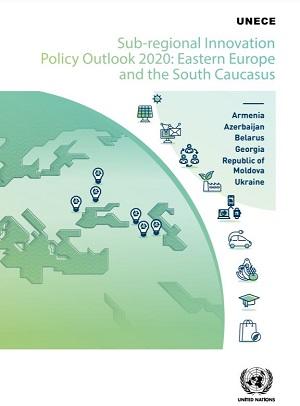
The countries of Eastern Europe and the South Caucasus (the EESC sub-region), Armenia, Azerbaijan, Belarus, Georgia, the Republic of Moldova and Ukraine have come a long way in their transition from centrally planned towards market-based economies. After a difficult first decade following independence from the Soviet Union, wide-spread reforms triggered and sustained solid growth over the past two decades.
Maintaining this momentum, however, is increasingly difficult – especially in the wake of several disruptive events over the past years, including the severe socio-economic impact of COVID-19 and the fiscal strain of mitigating its effects. Many of the drivers of growth, such as investment into soft and hard infrastructure and market-seeking opportunities, are running out of steam. As countries continue grappling with the health, societal and economic challenges created by the pandemic, more needs to be done to strengthen the foundations for sustainable development and economic resilience.
Innovation is central to addressing these challenges and to fostering sustainable development, including a transition towards an increasingly circular economy, more broadly. This involves creating societies where many stakeholders systematically try out new ways of creating value, transacting, and interacting. This, in turn, requires innovation in governance and the role of public policy.
EESC countries show strong potential for innovation, notably high levels of education attainment, a tangible and viable legacy of applied and basic research, and proximity to a range of markets, including the European Union. Recognising the imperative of innovative development, EESC countries are keen to build on these advantages. EESC countries have already taken concerted steps to promote innovation – including showing strong political commitment and investing into a range of new agencies and institutions. Several examples involving, for instance, foreign investment into production or the rise of export-oriented ICT and business-process outsourcing (BPO) services show the way.
To fully use this potential, however, innovation policies and institutions need to play an even more productive role. Due to the unpredictability of innovation, current traditional approaches to innovation policy design are becoming less effective and need to be replaced with a more transparent and flexible approach to supporting innovation across various stages in the innovation policy cycle. This will require expanding the focus of innovation policy beyond only public research and technology start-ups, setting up and extending institutional capacities to adequately enable and encourage experimentation in governance and reinforcing effective funding mechanisms to support innovation.
The recently launched UNECE publication Sub-regional Innovation Policy Outlook 2020: Eastern Europe and the South Caucasus (IPO), provides EESC countries with a roadmap to harness innovation for recovering better from COVID-19. The UNECE publication provides guidance for implementing sound innovation policies, building strong innovation policy institutions, and enhancing innovation governance processes. The IPO project was made possible with the generous funding from the government of Sweden.
At a webinar on 30 March, representatives from EESC governments underlined their commitment to placing innovation policy at the heart of their economic reform agenda and to using the results and recommendations of the IPO to inform this process. Indeed, EESC governments have already taken strides to implement IPO recommendations since its release on 25 November 2020:
- The Ministry of High-Tech Industry of Armenia has launched a national innovation programme to fund technology start-ups across various stages of development.
- The Ministry of Transport, Communication and High Technologies of Azerbaijan is putting together comprehensive new state programmes that concretise the country’s priorities for innovative development and include not only support incubation and acceleration measures, but also include efforts to increase research and development and venture capital investments within the national innovation system.
- The State Committee of Science and Technology of Belarus has developed new programmes on innovation and applied research and development, which are currently pending approval.
- The Georgia Innovation and Technology Agency and the State Procurement Agency are piloting and building capacities for rolling out systematic use of the potential for procurement to enable and promote innovation - based on the IPO and the 2020 UNECE Innovation for Sustainable Development Review of Georgia.
- The Ministry of Education, Culture and Research of the Republic of Moldova is updating the current action plan for developing a smart specialization strategy. The Ministry is also drafting an action plan for mapping the research and innovation infrastructure of the country and working on the draft of the education development strategy for 2021-2030.
- The Ministry of Education and Science of Ukraine is working on the first action plan for the adopted Innovation Development Strategy 2030 of Ukraine, which will be submitted to the Cabinet of Ministers and has also prepared new draft laws on innovation activity and on technology transfer activities in Ukraine.
These initiatives respond to specific country-level and sub-regional recommendations of the IPO 2020 publication. EESC governments have expressed great interest and commitment to continuing the sub-regional collaboration in support of innovative policy development in subsequent iterations of the IPO.

